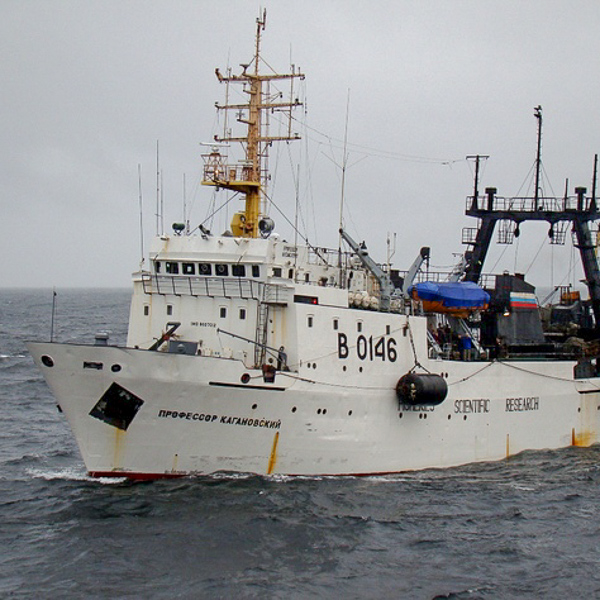Scientists go fishing for salmon answers
B.C. salmon farmers among the first to step up and sponsor a $1.2-million Gulf of Alaska science expedition.
By Fabian Dawson and Samantha McLeod
SeaWestNews
Every winter, much of the world’s salmon congregates in the Gulf of Alaska.
It is here next February, that 17 scientists on board the Russian research trawler Professor Kaganovsky (pictured) will be fishing for answers to better predict how the changing ocean environment affect salmon production.
“This has never been done before,” said Fisheries and Oceans Canada scientist emeritus Dr. Dick Beamish, the architect of project.
Dr. Beamish, who sealed the deal to charter the Russian research vessel over a glass of vodka in St. Petersburg, said the high seas expedition will search out genetic signatures to determine where the fish come from and test the salmon for disease, diet, size and health.
The 17 volunteer scientists, Dr. Beamish has assembled come from Canada, Japan, the Republic of Korea, the Russian Federation, and the United States of America, representing all five North Pacific Anadromous Fish Commission (NPAFC) member countries.
“What we need to know most about Pacific salmon, we mostly don’t know,” said Dr. Beamish, who outlined his $1.2-million-dollar project at the recent launch of the International Year of the Salmon in Vancouver.
He said the comprehensive survey of the Gulf of Alaska, where most sockeye, pink and chum salmon spend the winter will also provide answers to fish density, ocean temperature and salinity.
“We will be catching salmon using trawl nets…never been done before on such a large scale in the winter…not exactly a pleasant cruise but an important one,” Dr. Beamish told SeaWestNews.
Mark Saunders, Director North Pacific Region for the International Year of the Salmon (IYS) said Dr. Beamish’s expedition will address gaps in knowledge of salmon in the open ocean.
The expedition is one of the signature projects of the IYS, is an initiative of the NPAFC and its North Atlantic partner, the North Atlantic Salmon Conservation Organization (NASCO) to establish a new hemispheric-scale partnership of government, Indigenous Peoples, academia, NGOs, and industry to effectively connect the hundreds of organizations that have capacity and desire to address the scientific and social challenges facing salmon and people in an increasingly uncertain environment.
The 2019 Gulf of Alaska Expedition from February 15 to March 14, has been jointly funded by a combination of government, NGOs, private contributions and industry, including the B.C. Salmon Farmers Association (BCSFA)
“The International Year of Salmon is a unique opportunity to bring together scientists, First Nations, governments, companies, and other interests in Canada and around the world to share ideas and insights and celebrate these important species,” said John Paul Fraser, Executive Director of the BC Salmon Farmers Association.
“B.C.’s salmon farmers are already supporting independent research, wild salmon habitat restoral projects, and hatcheries and are committed to doing even more in support of the International Year of the Salmon.”
The BCSFA, which represents 56 businesses and organizations throughout the value chain of finfish aquaculture in B.C., was among the first to step up and sponsor a $1.2-million science expedition.
The industry generates over $1.5-billion towards the B.C. economy, resulting in over 6,600 jobs.
“As farmers in our ocean we are passionate about wild salmon and have a duty to be part of the solution to the challenges they are facing,” said Fraser.
RELATED STORIES
Sea change coming for aquaculture in Canada
Salmon sleuths on the hunt for “likely suspects”

